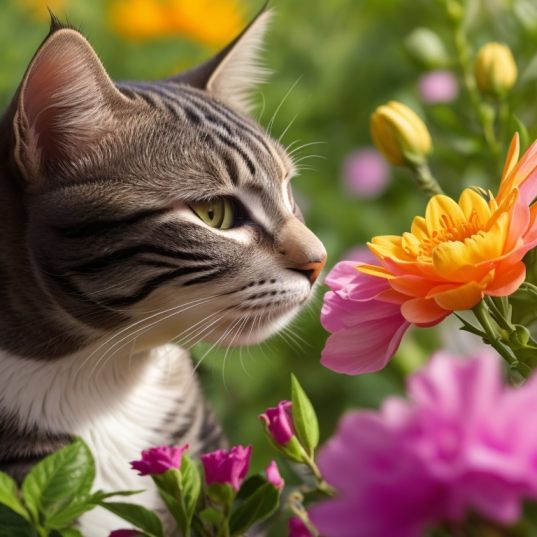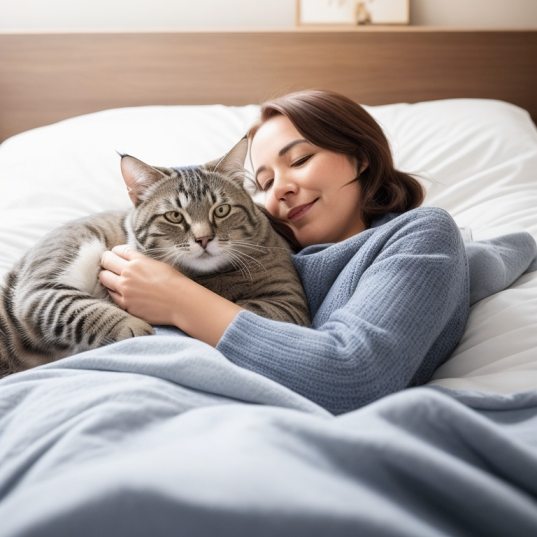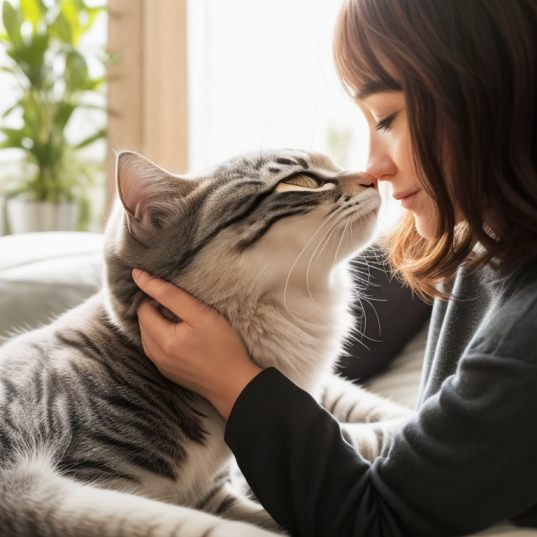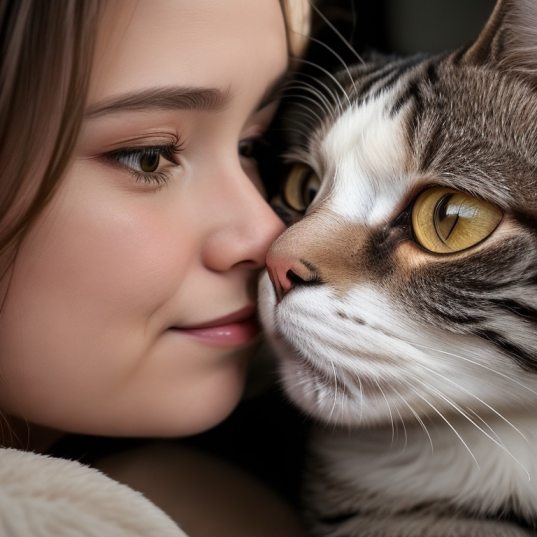Why Does My Cat Smell My Breath? It’s a question that has puzzled cat owners for years. Picture this: you’re enjoying a quiet moment with your feline friend, and out of nowhere, they lean in, their whiskers tickling your face, and they start sniffing your breath. It’s a behavior that’s both endearing and mystifying, leaving many of us wondering, “Why do cats do that?” In this article, we’re going to uncover the fascinating reasons behind this peculiar feline behavior. From their acute sense of smell to their curious nature, we’ll explore the many facets of your cat’s personality that contribute to this unique interaction. So, let’s dive into the world of cats and understand the intriguing story behind why your cat might be so interested in your breath.
Understanding the Cat’s Sense of Smell

Before we dive into the reasons behind your cat’s breath-sniffing antics, it’s crucial to understand just how remarkable a cat’s sense of smell is. Unlike humans, who rely heavily on vision, cats experience the world primarily through scent. Their olfactory abilities are extraordinary, with millions of scent receptors in their noses, allowing them to detect odors with incredible precision. This heightened sense of smell plays a significant role in their daily lives.
The Curiosity Factor: Unraveling Feline Inquisitiveness
Cats are often described as curious creatures, and for a good reason. Their innate curiosity is a defining trait of their personality and one of the things that make them such intriguing companions. Here, we’ll explore the concept of “The Curiosity Factor” in cats, shedding light on why they seem compelled to investigate everything in their environment, including your breath.
1. Evolutionary Advantage
The foundation of a cat’s curiosity lies in their evolutionary history. Cats are natural hunters, and their ancestors needed to be inquisitive to survive. Their curious nature helps them explore new territories, locate potential prey, and identify potential threats. In the wild, this curiosity aids in finding hidden prey or detecting predators before they become a threat.
2. Sensory Exploration
Cats experience the world through their senses, and curiosity is their way of exploring and making sense of their surroundings. Their acute sense of smell, keen hearing, and sharp eyesight all contribute to their need to investigate everything. When your cat sniffs your breath, they’re using their sense of smell to gather information about you and their environment.
3. Learning and Adaptation
Curiosity also plays a crucial role in a cat’s learning process. When they interact with various objects, people, or situations, they gain valuable information about their world. This information helps them adapt and make decisions. It’s their way of assessing whether something is safe, interesting, or potentially beneficial.
4. Mental Stimulation
Curiosity is mentally stimulating for cats. It provides mental exercise and enrichment, keeping their minds sharp and active. Engaging in investigative behaviors, like exploring your breath, is a form of mental stimulation for them. Boredom is often a trigger for undesirable behaviors in cats, so fostering their curiosity can help keep them mentally engaged and content.
5. Bonding and Communication
Curiosity isn’t just about satisfying their need for information; it’s also a means of communication and bonding. When your cat investigates you, they’re expressing interest and affection. This interaction can strengthen the bond between you and your feline companion. It’s their way of saying, “I’m curious about you, and I want to be close to you.”
6. Unpredictable Nature
One of the fascinating aspects of a cat’s curiosity is its unpredictability. Cats are known for their independence and selective attention. While they may be curious about your breath one moment, they might completely ignore it the next. This unpredictability adds to their charm and keeps their behaviors intriguing.
Scent Recognition
Cats are masters of scent recognition. They associate specific smells with particular individuals, animals, and objects. This ability helps them identify their territory, locate prey, and, yes, even recognize their human companions.
Possible Reasons Why Cats Smell Their Owner’s Breath

Let’s explore in detail the possible reasons why cats might be inclined to smell their owner’s breath. This behavior, while seemingly strange at times, can be attributed to a variety of factors:
1. Affection and Bonding:
- Cats are known to be affectionate creatures, and they express their feelings in unique ways. When your cat sniffs your breath, it can be a sign of affection and a desire to be close to you. Cats have scent glands in their cheeks, and by nuzzling or sniffing you, they are marking you as a part of their territory. This behavior can be a way for your cat to strengthen the bond between you and establish a sense of closeness.
2. Comfort and Familiarity:
- Your breath carries your unique scent, which your cat associates with you and home. Cats find comfort in familiar scents and environments. Smelling your breath might provide a sense of security and reassurance to your cat, especially during moments when they seek comfort or relaxation.
3. Curiosity and Exploration:
- Cats are naturally curious creatures, as we discussed earlier. They explore their surroundings and the people in their lives through their highly developed sense of smell. Your breath may simply be another interesting scent that piques their curiosity. Your cat might be trying to gather information about you or your recent activities.
4. Communication:
- Cats communicate with each other and their owners through scent. When your cat sniffs your breath, it’s possible that they are picking up on changes in your scent. They might be trying to understand your emotional state or even detect any changes in your health. Cats are known to be sensitive to subtle changes in their environment and the people around them.
5. Health-Related Concerns:
- While not always the case, some cats may show an unusual interest in their owner’s breath if they sense changes that could be related to health issues. Cats have been known to detect certain medical conditions through their acute sense of smell. If your cat’s curiosity about your breath seems persistent or significantly different from their usual behavior, it might be worth paying attention and consulting a veterinarian if necessary.
6. Habit or Routine:
- Sometimes, cats develop certain behaviors as part of their routine or habit. If your cat has observed you doing a particular action, like yawning or speaking, and then sniffed your breath afterward, it could become a habitual behavior. Cats often engage in behaviors that they associate with positive experiences or attention from their owners.
When to Be Concerned
While it’s usually harmless and even endearing when your cat sniffs your breath, there are instances where you should be cautious. If your cat suddenly exhibits an intense interest in your breath or consistently sniffs it in an unusual way, it could be a sign of an underlying health issue. Dental problems, respiratory issues, or even gastrointestinal problems can sometimes manifest as changes in your breath odor. If you’re concerned, consult your veterinarian for guidance.
How to React to Your Cat’s Breath-Smelling Behavior

Responding to your cat’s breath-smelling behavior requires a combination of understanding, patience, and consideration for your cat’s needs and feelings. Here’s a detailed guide on how to react to your cat’s breath-smelling behavior:
1. Stay Calm and Relaxed:
- When your cat leans in to smell your breath, remain calm and relaxed. Sudden or exaggerated reactions can startle your cat or make them anxious. Instead, gently acknowledge their curiosity with a calm demeanor.
2. Allow the Interaction:
- Cats use scent as a way of exploring and interacting with their environment, including their owners. Allow your cat to investigate your breath if they choose to do so. Refrain from pushing them away or scolding them for this behavior.
3. Positive Reinforcement:
- Use positive reinforcement to encourage desirable behaviors. If your cat’s breath-smelling behavior is accompanied by gentle purring or affectionate behavior, reward them with pets, cuddles, or treats. This positive association can strengthen your bond.
4. Respect Boundaries:
- While it’s important to be accommodating of your cat’s curiosity, also respect their boundaries. If your cat seems uncomfortable or withdraws after investigating your breath, give them space and don’t force interaction.
5. Engage in Play and Quality Time:
- To channel your cat’s curiosity and energy positively, engage in interactive play sessions and spend quality time together. Cats often use play as a means of exploration, so providing them with toys and opportunities for play can be beneficial.
6. Maintain Oral Health:
- Ensure that your own oral health is in good condition. Your cat’s interest in your breath might be due to changes in scent related to dental issues. Regular dental check-ups and oral hygiene can prevent unpleasant odors and potential health problems.
7. Monitor for Health Changes:
- Pay attention to any persistent changes in your cat’s behavior, especially if they become fixated on smelling your breath or exhibit unusual behavior patterns. If you suspect health issues, consult your veterinarian for a thorough examination.
8. Create a Comfortable Environment:
- Make sure your home environment is comfortable and enriching for your cat. Provide cozy resting spots, scratching posts, and vertical space for them to explore. A happy and content cat is less likely to engage in compulsive behaviors.
9. Be Patient and Understanding:
- Remember that cats have unique personalities and behaviors. They may display curiosity in various ways, and breath-smelling is just one example. Be patient and understanding of your cat’s individuality.
10. Seek Professional Advice if Necessary:
- If your cat’s breath-smelling behavior becomes obsessive, distressing, or is accompanied by other concerning signs, it’s wise to seek professional advice from a veterinarian or a certified animal behaviorist. They can assess the situation and provide guidance tailored to your cat’s specific needs.
Also Read-
- Can Cat Pee Get You High? Debunking the Myths
- How Long Can You Leave Cats Alone with Food and Water?
FAQs (Frequently Asked Questions)
1. Why do cats like to smell your mouth?
Cats are naturally curious animals with a keen sense of smell. They may be drawn to the scent of your breath as a way of investigating and connecting with you. It can also be a sign of affection and bonding.
2. Why does my cat smell my nose and mouth?
Cats often explore their environment and their owners’ faces using their sense of smell. It’s a way for them to gather information about you and their surroundings, and it can be a form of interaction and communication.
3. Why does my cat put his nose to my mouth?
When your cat places their nose near your mouth, it can be a sign of trust and comfort. They are familiar with your scent and may find it soothing or reassuring.
4. Why does my cat smell my breath when I’m sleeping?
Cats are most active during dawn and dusk, so they might investigate your breath during these times out of curiosity. Additionally, they may be checking on your well-being while you sleep.
5. Why does my cat want inside my mouth?
Cats don’t actually want to go inside your mouth; rather, they are exploring the scent and warmth around your mouth. It’s a natural behavior driven by their inquisitive nature.
6. Why do animals smell your breath?
Many animals, including cats, rely heavily on their sense of smell to gather information about their environment and the people and animals around them. Smelling your breath is a way for them to learn more about you.
7. Why do cats put their face in your face when sleeping?
Cats may nuzzle or place their face near yours while sleeping as a sign of trust, affection, and bonding. They find comfort in being close to their owners.
8. Do cats like to feel you breathe?
Cats are sensitive to changes in their environment, including your movements and breath. Feeling you breathe may provide them with reassurance and a sense of security.
9. Why is my cat sniffing me so hard?
If your cat is sniffing you intensely, it could be due to heightened curiosity or an interesting scent they’ve detected on you. It’s a natural behavior for cats to investigate their surroundings.
10. Why do cats push their head into you?
This behavior is known as “head bunting” and is a sign of affection and trust. Cats have scent glands on their heads, and they use this action to mark you as a part of their territory and show their love.
Conclusion
In the end, a cat’s interest in your breath is just another fascinating facet of their complex world. Understanding their heightened sense of smell and the reasons behind their behaviors can strengthen the bond between you and your feline friend. So, the next time your cat leans in for a sniff, embrace the moment and know that it’s a sign of their affection and curiosity.
Call to Action
Have you experienced similar intriguing behaviors from your cat? Share your stories with us in the comments below! And for more insights into your feline companion’s world, explore our other articles on cat behavior and care.

